Lineage of Salem Mubarak Sabah the First


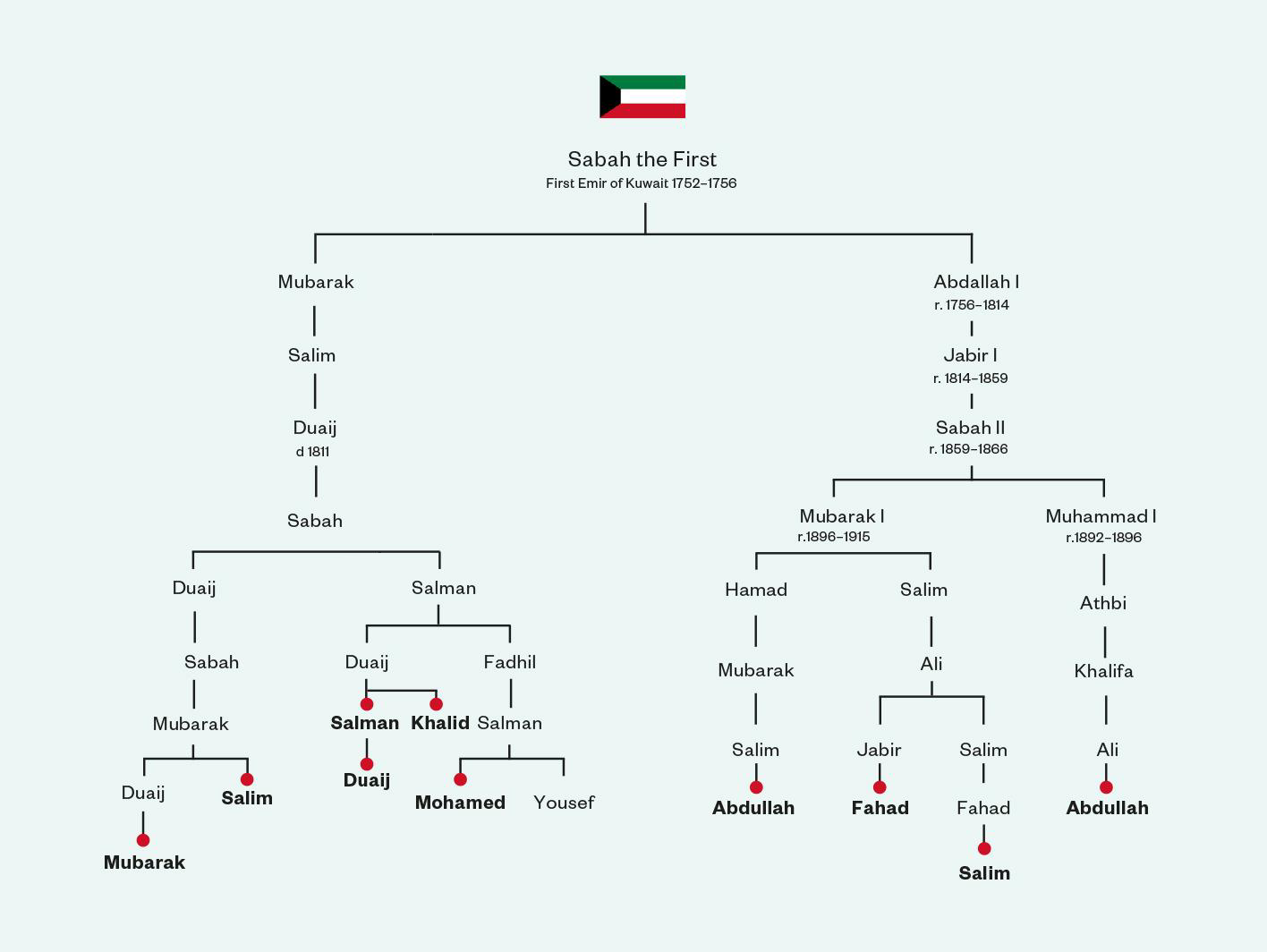
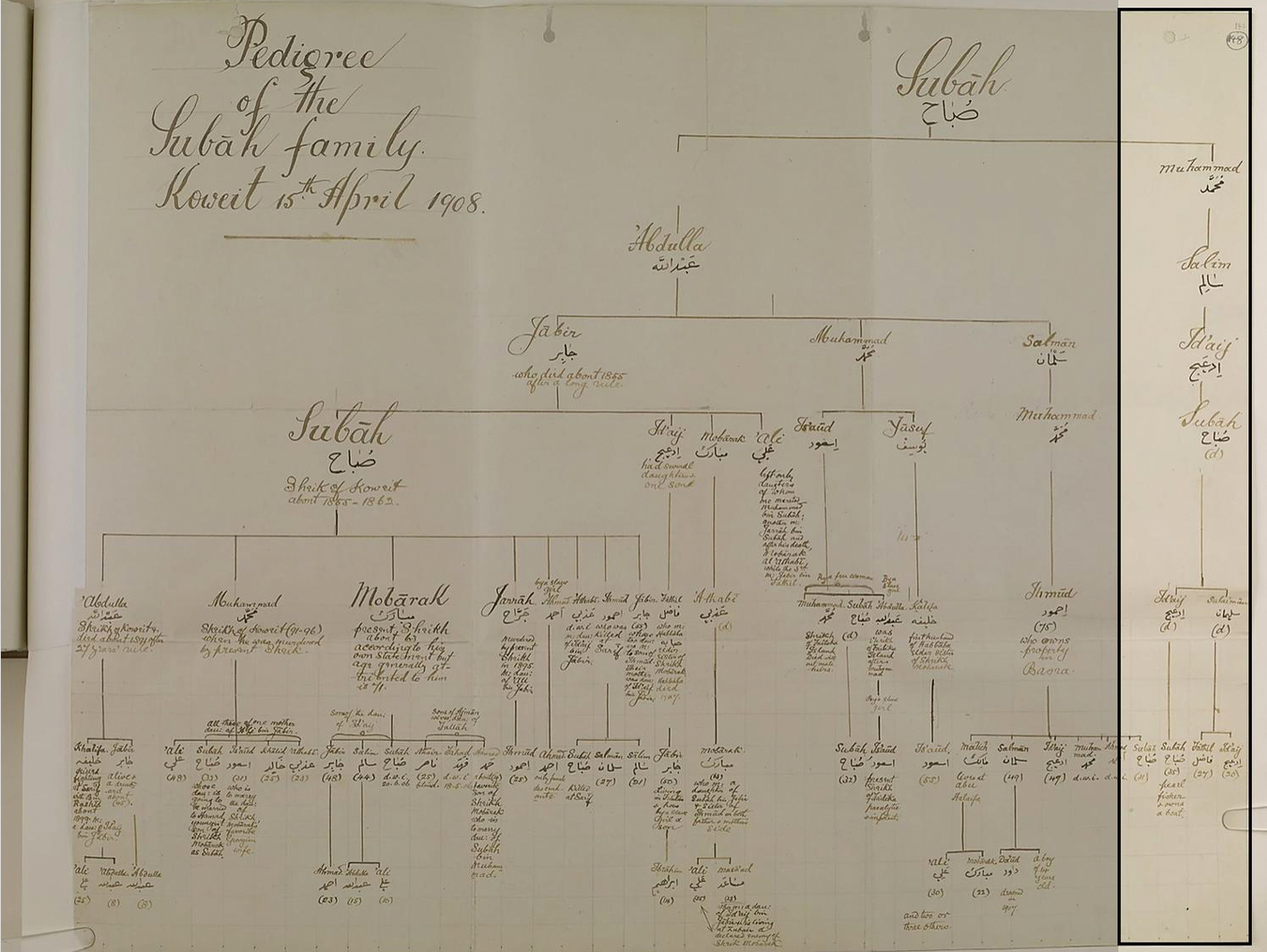


Eight generations:
Mubarak Sabah the First to Shaikh Duaij Salman Al Sabah

Shaikh Mubarak bin Sabah the First


Mubarak was the third son of Sabah the First. He is mentioned in a report dated 1756 by Baron Tiddo van Kniphausen, A Description of the Persian Gulf and its Inhabitants in 1756: The highest ranking shaikh is Mobarak Eben Saback [Mubarak bin Sabah], but because he is poor and still young, another, called Mahometh Eben Khalifa [Muhammad bin Khalifah], who is rich and possesses many vessels, enjoys almost equal respect among them.1
According to Rush, the Kniphausen document suggests that Mubarak Sabah the First likely ruled following his father’s abdication or death, perhaps in partnership with his brother, His Highness former Emir Abdullah Al Sabah.
The Kniphausen report implies that Sabah the First ruled earlier than is generally believed, that he abdicated or died in or before 1756, and that leadership then passed to two of his sons – Mubarak and Abdullah. It seems that Mubarak did not rule alone since, if he had done so, this would not have been forgotten. It is reasonable to assume that Sabah the First relied on Mubarak as well as Abdallah in his final years and that, as a respectful younger brother, Abdallah also consulted him.2
Shaikh Abdallah Khalid Al Khalifa of Bahrain, the former Minister of Justice and Islamic Affairs, who created Bahrain’s National History Documentation Centre, also believes that Mubarak succeeded his father, although only ruled for a short time: I believe that Sabah the First died before the year 1170 AH [1756-57 AD] and was succeeded by his son, Mubarak bin Sabah; and that after Mubarak’s death in about 1171 AH [1757-58 AD], his brother, Shaikh Abdallah bin Sabah, became the ruler.3 Shaikh Abdullah later confirmed his view that the descendants of Salim Mubarak Al Sabah are members of the ruling family.
According to Rush, the Kniphausen document suggests that Mubarak Sabah the First likely ruled following his father’s abdication or death, perhaps in partnership with his brother, His Highness former Emir Abdullah Al Sabah.
The Kniphausen report implies that Sabah the First ruled earlier than is generally believed, that he abdicated or died in or before 1756, and that leadership then passed to two of his sons – Mubarak and Abdullah. It seems that Mubarak did not rule alone since, if he had done so, this would not have been forgotten. It is reasonable to assume that Sabah the First relied on Mubarak as well as Abdallah in his final years and that, as a respectful younger brother, Abdallah also consulted him.2
Shaikh Abdallah Khalid Al Khalifa of Bahrain, the former Minister of Justice and Islamic Affairs, who created Bahrain’s National History Documentation Centre, also believes that Mubarak succeeded his father, although only ruled for a short time: I believe that Sabah the First died before the year 1170 AH [1756-57 AD] and was succeeded by his son, Mubarak bin Sabah; and that after Mubarak’s death in about 1171 AH [1757-58 AD], his brother, Shaikh Abdallah bin Sabah, became the ruler.3 Shaikh Abdullah later confirmed his view that the descendants of Salim Mubarak Al Sabah are members of the ruling family.

Shaikh Salim bin Mubarak bin Sabah the First
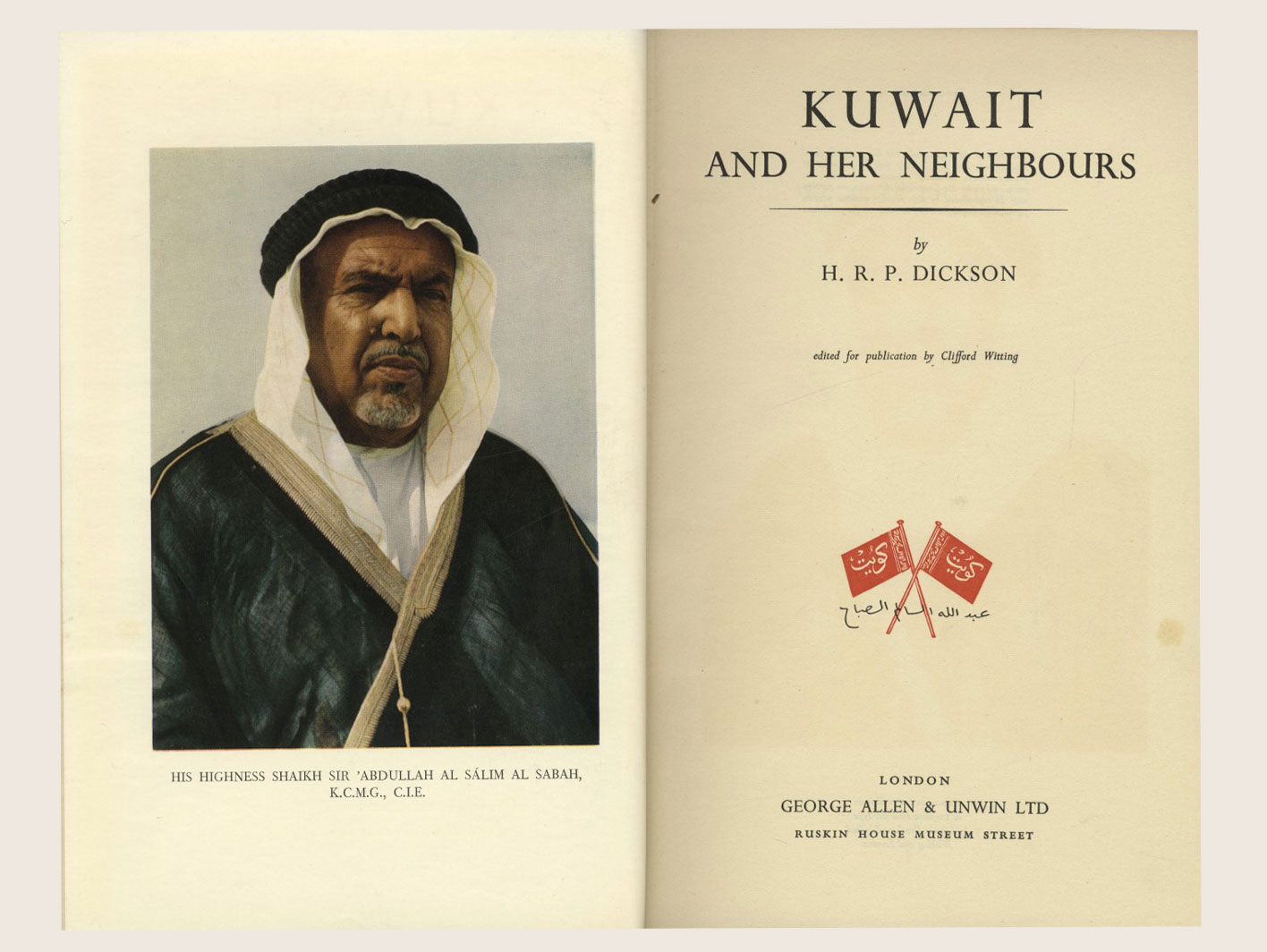
Except for Knox, who states that Salim’s father was Muhammad Sabah the First4, it is agreed that Salim’s father was Mubarak Sabah the First. He is mentioned as such in the Bombay report of 1854 and in the genealogical trees prepared in Kuwait by Shaikh Na’if Al Malik Al Sabah and by Mu’alim Ismail Kaddo5.
Salim bin Mubarak bin Sabah the First was one of the leaders in Kuwait’s first naval battle, the Battle of Al -Raqqa on 12 August 1783, against the Bani Ka’b.6 The battle was started by Salim’s daring initiative to attack enemy vessels. His Highness the former Emir Abdulah Al Sabah opposed an attempt by Shaikh Barakat of the Nassar clan of the Bani Ka’b to marry his only daughter. Mariam. Following the battle, Salim married Mariam bint Abdullah I, his first cousin.
The story is recounted by Lt Col Harold Dickson, the Political Agent in Kuwait from 1929-36 in his book, Kuwait and Her Neighbours. The story was told to him by His Highness former Emir Abdullah Salim Al Sabah.
… on the reported approach of the enemy the beautiful Mariam was regularly to be seen – armed with pistol, sword and spear, and riding a mare – going the rounds of the early city defences and encouraging the Badu in their tents. How her young cousin Salim ibn Muhammad Al Sabah [Salim bin Muburak] and his gallant band met the armada widely scattered and becalmed by night south of the island of Bubiyan and, in the guise of simple fisher-folk, boarded five great dhows one after the other, silently put the sentries to the sword, battened the remainder of the crew between decks, brought the prizes back to Kuwait and presented them to Mariam must be recorded in another place. Suffice it to say that after this initial success and inspired by the burning enthusiasm of Mariam, young Salim … sped out to sea, engaged the remainder of the Bani Ka’b ships and put them to ignominious flight … From that day to this no Sabah princess has ever been allowed to marry outside the family.7
Salim bin Mubarak bin Sabah the First was one of the leaders in Kuwait’s first naval battle, the Battle of Al -Raqqa on 12 August 1783, against the Bani Ka’b.6 The battle was started by Salim’s daring initiative to attack enemy vessels. His Highness the former Emir Abdulah Al Sabah opposed an attempt by Shaikh Barakat of the Nassar clan of the Bani Ka’b to marry his only daughter. Mariam. Following the battle, Salim married Mariam bint Abdullah I, his first cousin.
The story is recounted by Lt Col Harold Dickson, the Political Agent in Kuwait from 1929-36 in his book, Kuwait and Her Neighbours. The story was told to him by His Highness former Emir Abdullah Salim Al Sabah.
… on the reported approach of the enemy the beautiful Mariam was regularly to be seen – armed with pistol, sword and spear, and riding a mare – going the rounds of the early city defences and encouraging the Badu in their tents. How her young cousin Salim ibn Muhammad Al Sabah [Salim bin Muburak] and his gallant band met the armada widely scattered and becalmed by night south of the island of Bubiyan and, in the guise of simple fisher-folk, boarded five great dhows one after the other, silently put the sentries to the sword, battened the remainder of the crew between decks, brought the prizes back to Kuwait and presented them to Mariam must be recorded in another place. Suffice it to say that after this initial success and inspired by the burning enthusiasm of Mariam, young Salim … sped out to sea, engaged the remainder of the Bani Ka’b ships and put them to ignominious flight … From that day to this no Sabah princess has ever been allowed to marry outside the family.7

Shaikh Sabah bin Duaij bin Salem Al Sabah
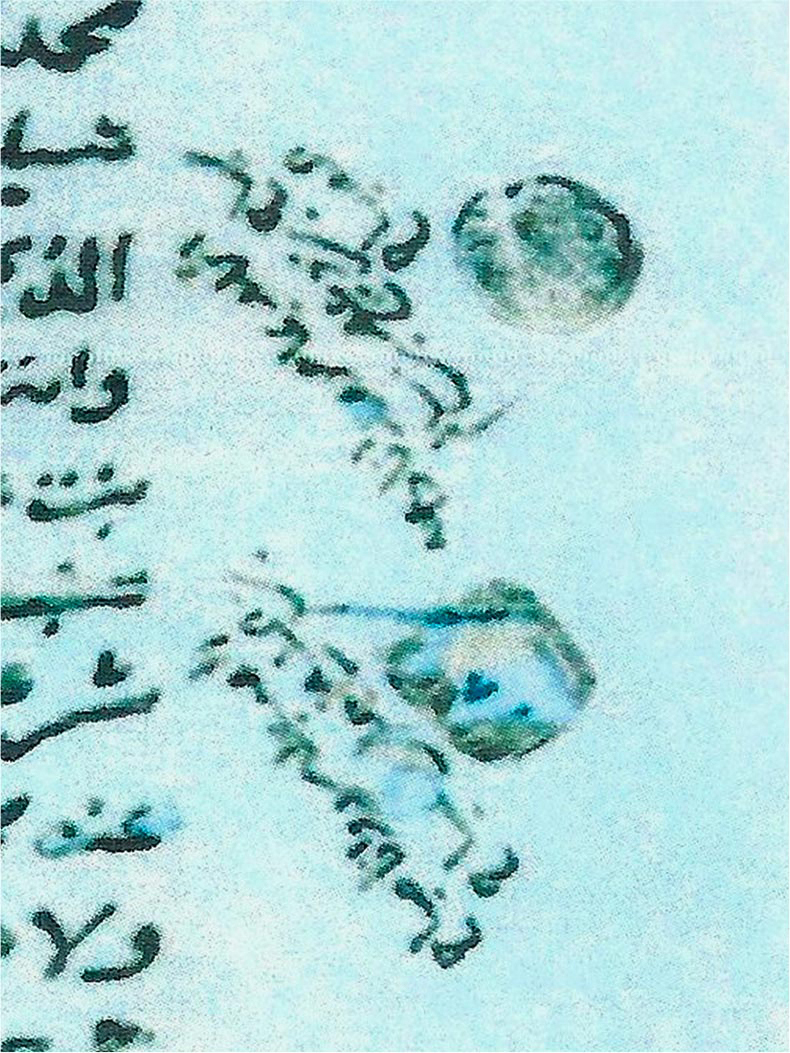
Shaikh Sabah was the grandson of Salim, the hero of the Battle of Al-Raqqa. His name appears alongside that of His Highness the former Emir Sabah II as a witness in a judicial verdict (known as an Adsani court order8) dated 22 August 1846. The court judgment was a dispute among Al Sabah family members, hence why members of the Al Sabah family were chosen as witnesses. The head of the court was Judge Abdullah Mohammad Al Adasani.

Shaikh Salman bin Sabah bin Duaij Al Sabah
b c1840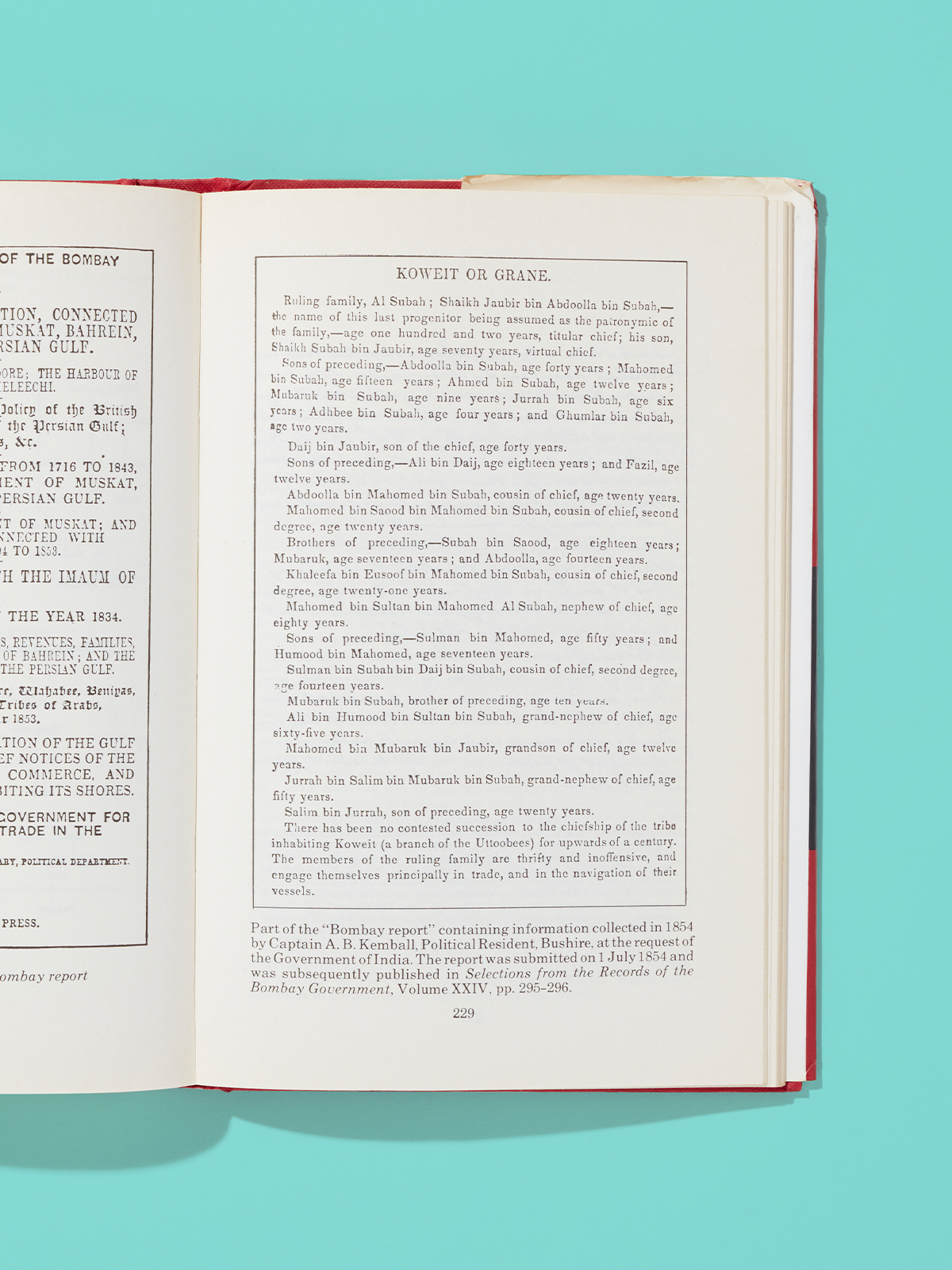
In 1854, Captain Arnold Burrowes Kemball, Resident of the Persian Gulf, based in Bushire, drew up a report on Kuwait, published in Selections from the Records of the Bombay Government.9 Known as the Bombay report, he describes Salman bin Sabah bin Duaij Al Sabah as cousin of chief [Jaber I Al Sabah, the 3rd Emir of Kuwait], second degree, age fourteen years, meaning that he was born in 1840.

Shaikh Muhammad bin Salim bin Jarrah Salim Mubarak Al Sabah
Martyred in the battle of Sarif, 1901
Muhammad was the great grandson of Salim, the hero of the Battle of Al Raqqa. Both his father, Salim (b c1834), and grandfather, Jarrah (b c1804) are mentioned by Kemball in his Bombay Report in 1854.
In 1900, a crisis erupted between Kuwait and the Najd, ruled over by Ibn Rashid, the Emir of Ha’il. Both Mubarak and Ibn Rashid strived to be the undisputed leader in Arabia. In December 1900, Shaikh Mubarak Al Sabah advanced into Najd, having gathered an impressive army of Kuwaiti townspeople, Saudi loyalists, and bedouin from all the important eastern Arabian tribes. His aim was to tear away the southern part of the Rashidi dominions, notably ‘Anayza, Burayda, and Riyadh. Mubarak had moderate success, capturing these three towns (except for the besieged citadel in Riyadh). However, his forces were defeated at the Battle of Sarif (near Burayda) on 17 March 1901. Hundreds of Kuwaitis died in the battle, including a brother and one or two nephews of His Highness the former Emir Mubarak Al Sabah the Great, and some Al Sabah family members, one of whom was Shaikh Muhammad bin Salim Al Sabah. Muhammad bin Salim Al Sabah’s death in the battle was reported by Ali Bin Ghulum Rida, the British Political Agent to Kuwait at the time.10
In 1900, a crisis erupted between Kuwait and the Najd, ruled over by Ibn Rashid, the Emir of Ha’il. Both Mubarak and Ibn Rashid strived to be the undisputed leader in Arabia. In December 1900, Shaikh Mubarak Al Sabah advanced into Najd, having gathered an impressive army of Kuwaiti townspeople, Saudi loyalists, and bedouin from all the important eastern Arabian tribes. His aim was to tear away the southern part of the Rashidi dominions, notably ‘Anayza, Burayda, and Riyadh. Mubarak had moderate success, capturing these three towns (except for the besieged citadel in Riyadh). However, his forces were defeated at the Battle of Sarif (near Burayda) on 17 March 1901. Hundreds of Kuwaitis died in the battle, including a brother and one or two nephews of His Highness the former Emir Mubarak Al Sabah the Great, and some Al Sabah family members, one of whom was Shaikh Muhammad bin Salim Al Sabah. Muhammad bin Salim Al Sabah’s death in the battle was reported by Ali Bin Ghulum Rida, the British Political Agent to Kuwait at the time.10

Shaikh Sabah Al Suq bin Duaij Al Sabah
b. 1873

Sabah Al Suq was Commander of the Town Guard or market guards in Kuwait – effectively the security chief – from 1917-38. He maintained order on behalf of His Highnesses former Emirs Shaikh Salim Mubarak Al Sabah and Shaikh Ahmad Jabir Al Sabah.
There are many stories about Sabah Al Suq. The following comes from the Kuwait Times (4 November 2015):
A funny yet terrifying incident took place back in 1937 when an armed gang, or at least that was the people thought at the time, kept robbing houses. People used to hear gunshots at night and immediately lock their doors and windows and stay up all night to resist the robbers in case they were attacked by the gang that used to rob a different neighborhood every night.
People were terrified for a whole week, and news about the gang of robbers travelled fast as people kept telling stories about how the robbers robbed the so and so family in Merqab or climbed the walls of another in Qebla.People were in great distress and fear.
The security chief at the time was Shaikh Sabah Al Duaij Al Sabah who was publically known as ‘Sabah Al-Souk’ (Sabah of the Market). The man suspected his own guards and accordingly examined their rifles by an expert to see whether any had been used in recent shootings during the night. They were all proven innocent, but Sabah eventually managed to identify and arrest the gang.
It turned out that the gang comprised of a young man named ‘Mahdali’ who had an old shotgun and was assisted by another, a porter to carry the items he stole. They were both arrested and chained by the hands to be taken on a tour around the old souk so that people could see them and rest assured. Kids chased the suspects lane to lane shouting: “That is the thief, Mahdali…..he is chained by the hand.” Accordingly, like Kuwaitis used to name years after major incidents, 1937 was later known as the ‘Year of Mahdali.’
There are many stories about Sabah Al Suq. The following comes from the Kuwait Times (4 November 2015):
A funny yet terrifying incident took place back in 1937 when an armed gang, or at least that was the people thought at the time, kept robbing houses. People used to hear gunshots at night and immediately lock their doors and windows and stay up all night to resist the robbers in case they were attacked by the gang that used to rob a different neighborhood every night.
People were terrified for a whole week, and news about the gang of robbers travelled fast as people kept telling stories about how the robbers robbed the so and so family in Merqab or climbed the walls of another in Qebla.People were in great distress and fear.
The security chief at the time was Shaikh Sabah Al Duaij Al Sabah who was publically known as ‘Sabah Al-Souk’ (Sabah of the Market). The man suspected his own guards and accordingly examined their rifles by an expert to see whether any had been used in recent shootings during the night. They were all proven innocent, but Sabah eventually managed to identify and arrest the gang.
It turned out that the gang comprised of a young man named ‘Mahdali’ who had an old shotgun and was assisted by another, a porter to carry the items he stole. They were both arrested and chained by the hands to be taken on a tour around the old souk so that people could see them and rest assured. Kids chased the suspects lane to lane shouting: “That is the thief, Mahdali…..he is chained by the hand.” Accordingly, like Kuwaitis used to name years after major incidents, 1937 was later known as the ‘Year of Mahdali.’

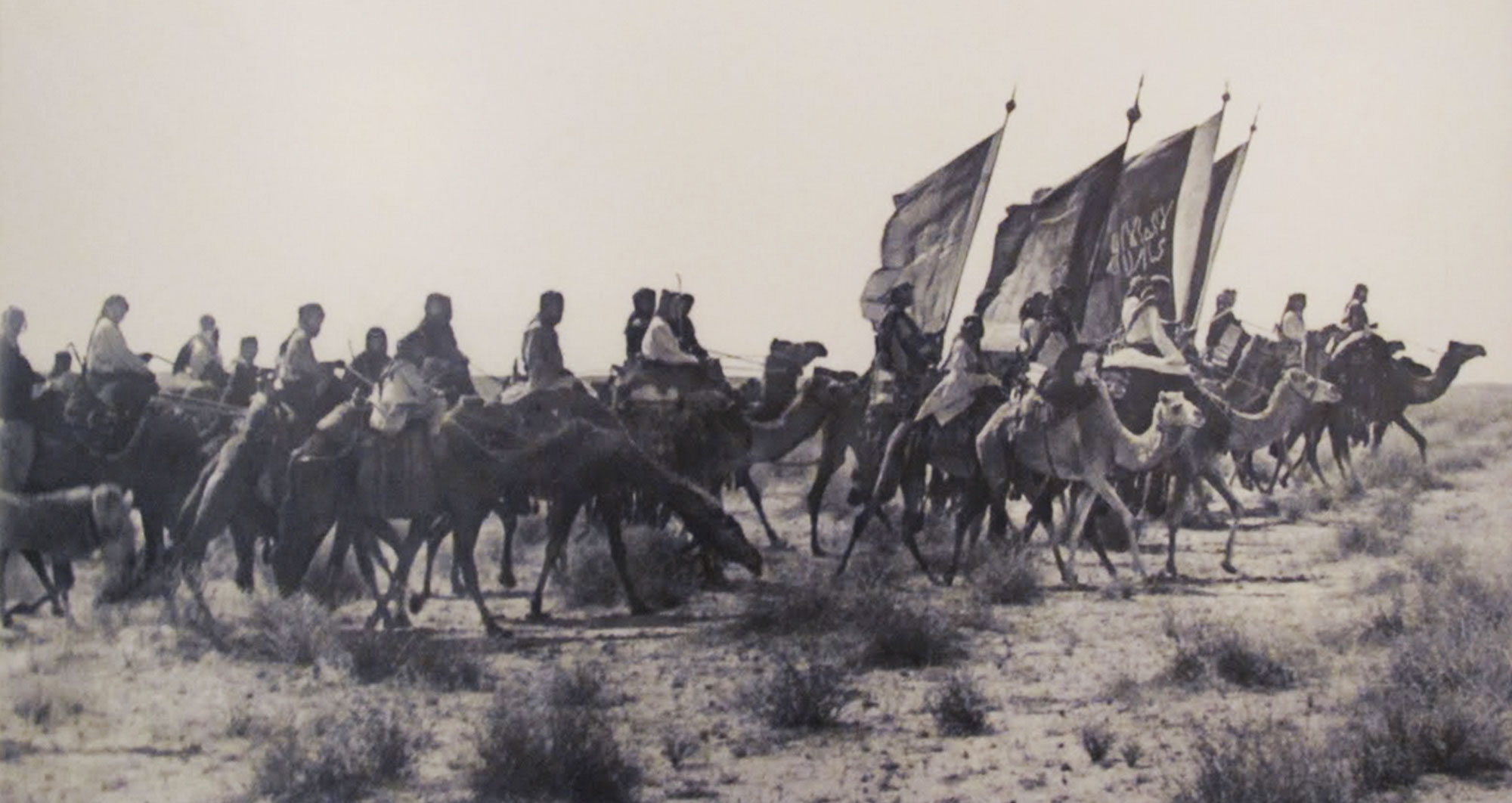
Ikhwan cavalry
Shaikh Duaij bin Salman Al Sabah
b 1888, d 1939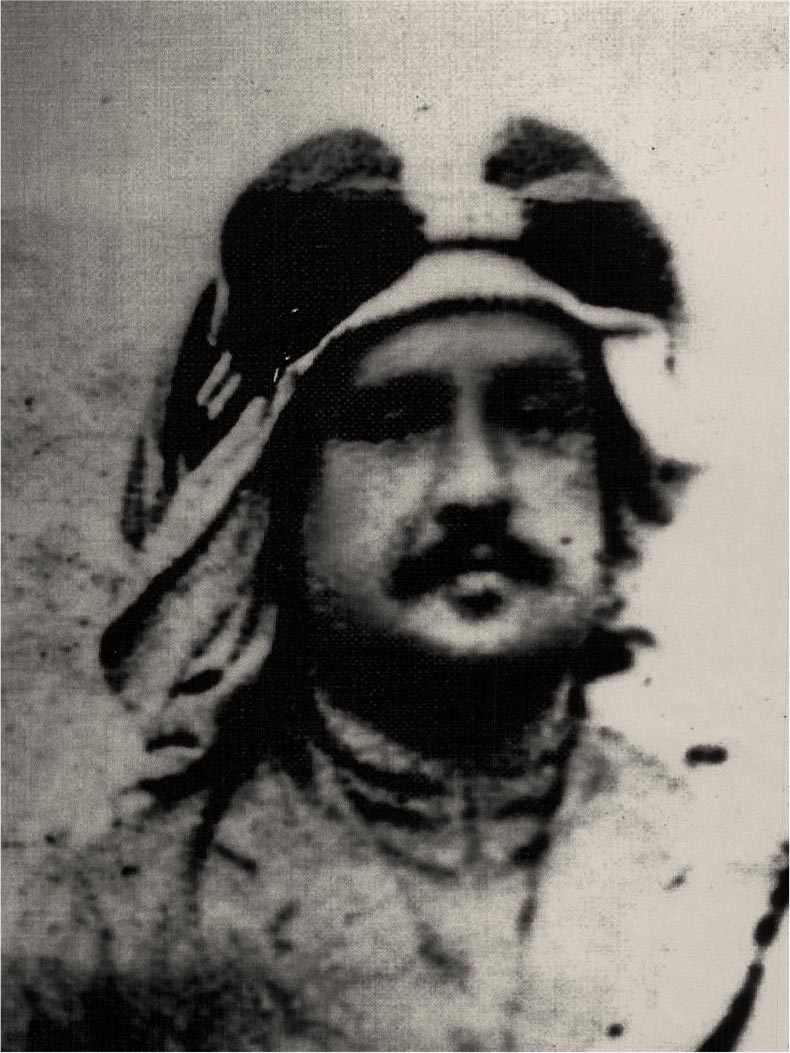

Shaikh Duaij bin Salman Al Sabah was brought up by His Highness the former Emir Shaikh Salim Mubarak Al Sabah, his father having died when he was about thirteen years old. Duaij defended Kuwait from the Saudi Ikhwan and the spread of Wahhabi revivalism during the Kuwait-Najd battles in 1920. He was also part of a committee to defend Kuwait, led by His Highness the former Emir Shaikh Salim Mubarak Al Sabah.
The battle of Hamdh took place from 18-24 May 1920. Following the First World War and the collapse of the Ottoman empire, the Ikhwan in Saudi Arabia planned to take over the whole of the Arabian Peninsula. They attempted to establish a stronghold south of Kuwait, at Jarriya al-‘Ulya, under Ibn Shuqayr. The Emir sent a force of 100 Kuwaiti cavalry and 200 Kuwaiti infantrymen commanded by Duaij to dislodge them. Ibn Shuqayr sent a plea for help to Faisal Al Dawish, the leader of the Ikhwan. The Kuwaiti forces were vastly outnumbered by Al Dawish’s 2,000 Ikhwan fighters, but they held out for six days. The Kuwaitis suffered heavy losses with the wounded being treated with salt and water as no medicine was available.
Following the battle of Hamdh, His Highness the former Emir Shaikh Salem Mubarak Al Sabah decided to construct a five mile wall around Kuwait to protect the city (the third wall), which began the following month during Ramadan and involved most of the inhabitants of Kuwait. Within less than five months the battle of Al Jahra took place on 10 October 1920.
The Kuwaiti forces were led by the former Emir himself, His Highness the former Emir Shaikh Salem Mubarak Al Sabah; Duaij was one of the cavalry commanders in the battle. A force of 3,000-4,000 Ikhwan attacked and besieged the Red Fort at Al-Jahra, which was defended by 1,500 Kuwaitis. The Kuwaiti forces fought bravely and repulsed the Ikhwan attack, allowing time for the Emir to call in help from British troops, who provided airplanes and three warships ending the Ikhwan attacks.11
The Kuwait-Najd battles were ended by the Uqair Protocol of 1922, which defined Kuwait’s current boundaries.
The battle of Hamdh took place from 18-24 May 1920. Following the First World War and the collapse of the Ottoman empire, the Ikhwan in Saudi Arabia planned to take over the whole of the Arabian Peninsula. They attempted to establish a stronghold south of Kuwait, at Jarriya al-‘Ulya, under Ibn Shuqayr. The Emir sent a force of 100 Kuwaiti cavalry and 200 Kuwaiti infantrymen commanded by Duaij to dislodge them. Ibn Shuqayr sent a plea for help to Faisal Al Dawish, the leader of the Ikhwan. The Kuwaiti forces were vastly outnumbered by Al Dawish’s 2,000 Ikhwan fighters, but they held out for six days. The Kuwaitis suffered heavy losses with the wounded being treated with salt and water as no medicine was available.
Following the battle of Hamdh, His Highness the former Emir Shaikh Salem Mubarak Al Sabah decided to construct a five mile wall around Kuwait to protect the city (the third wall), which began the following month during Ramadan and involved most of the inhabitants of Kuwait. Within less than five months the battle of Al Jahra took place on 10 October 1920.
The Kuwaiti forces were led by the former Emir himself, His Highness the former Emir Shaikh Salem Mubarak Al Sabah; Duaij was one of the cavalry commanders in the battle. A force of 3,000-4,000 Ikhwan attacked and besieged the Red Fort at Al-Jahra, which was defended by 1,500 Kuwaitis. The Kuwaiti forces fought bravely and repulsed the Ikhwan attack, allowing time for the Emir to call in help from British troops, who provided airplanes and three warships ending the Ikhwan attacks.11
The Kuwait-Najd battles were ended by the Uqair Protocol of 1922, which defined Kuwait’s current boundaries.

Shaikh Salman bin Fadhil Al Sabah
b. 1908

Shaikh Salman bin Fadhil Al Sabah was the great grandson of Shaikh Sabah bin Duaij bin Salem Al Sabah. He was Commander of the Town Guard from 1938-45, succeeding Shaikh Sabah Al Suq.

Shaikh Khalid bin Duaij Al Sabah
b 1933
In September 1989, Shaikh Khalid Duaij Al Sabah was appointed by
His Highness the former Emir Jabir Ahmad Al Sabah as one of 16 members of a committee to carry out the duties of the Municipal Council of Kuwait. Following the liberation of Kuwait, the Emir reappointed Shaikh Khaled as a member of the Municipal Council in July 1991. The Municipal Council, which was established in 1932, is in charge of the provision of local services in Kuwait City, such as roads, urban planning, garbage collections and sanitation.

Shaikh Salman bin Duaij Al Sabah
b 1939
Shaikh Salman Duaij Al Sabah is an eminent figure in the modern history of Kuwait. In addition to his considerable contributions in the political, social and cultural spheres, his prominent role in establishing the current legal infrastructure in Kuwait stands out as a major achievement.
Salman was appointed Minister of State for Legal and Administrative Affairs in 1976 and subsequently Minister for Justice, Legal and Administrative Affairs in 1981. During this time, he carried out a wholesale reform of the Kuwaiti legal system, leading to a legislative renaissance in the country. Until that time, despite the country’s independence, Kuwait was still applying the Ottoman civil code, known as the Mecelle. Regional and international events made legislative and administrative reforms during this period challenging.
Salman established specialized and technical committees to study and review all the existing legislation, enacting new legislation where necessary in order to bring Kuwaiti law in line with advanced legal systems. He began by implementing the Social Security Act 61/1976, establishing the Public Institution for Social Security, and in 1979 enacted the Civil Service Act 15/1979.
1980 was a year of huge legislative reform. Salman issued the Civil Code by decree No 67/1980, to replace the Ottoman legislation, the Mecelle, the Commercial Code by decree No 68/1980 and the Maritime Trade Code by decree No. 28/1980. In addition, he enacted important laws for the system and procedures of courts, notably the Civil and Commercial Procedures Law by decree No. 38/1980 and the Law of Evidence in Civil and Commercial Articles by decree No. 39/1980. The Personal Status Law No. 51/1984 should also be mentioned.
These laws marked an unprecedented leap forward for the country. They were enacted in less than a decade under Salman with the approval of the National Assembly. Collectively they constitute the fundamental laws for Kuwait today.
Salman was appointed Minister of State for Legal and Administrative Affairs in 1976 and subsequently Minister for Justice, Legal and Administrative Affairs in 1981. During this time, he carried out a wholesale reform of the Kuwaiti legal system, leading to a legislative renaissance in the country. Until that time, despite the country’s independence, Kuwait was still applying the Ottoman civil code, known as the Mecelle. Regional and international events made legislative and administrative reforms during this period challenging.
Salman established specialized and technical committees to study and review all the existing legislation, enacting new legislation where necessary in order to bring Kuwaiti law in line with advanced legal systems. He began by implementing the Social Security Act 61/1976, establishing the Public Institution for Social Security, and in 1979 enacted the Civil Service Act 15/1979.
1980 was a year of huge legislative reform. Salman issued the Civil Code by decree No 67/1980, to replace the Ottoman legislation, the Mecelle, the Commercial Code by decree No 68/1980 and the Maritime Trade Code by decree No. 28/1980. In addition, he enacted important laws for the system and procedures of courts, notably the Civil and Commercial Procedures Law by decree No. 38/1980 and the Law of Evidence in Civil and Commercial Articles by decree No. 39/1980. The Personal Status Law No. 51/1984 should also be mentioned.
These laws marked an unprecedented leap forward for the country. They were enacted in less than a decade under Salman with the approval of the National Assembly. Collectively they constitute the fundamental laws for Kuwait today.

Shaikh Duaij bin Salman Al Sabah
b 1970
At the age of 19, following the Iraqi invasion of Kuwait, Shaikh Duaij Salman Al Sabah joined the resistance forces and participated in defending his beloved country.


